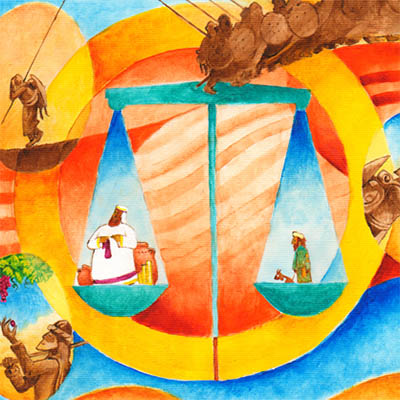Ki Teitzei – Deut. 21:10-25:19 (Aug.20/21)

As the Torah Turns
Rabbi Lader’s Weekly D’var Torah
Ki Teitzei – Deut. 21:10-25:19 (Aug. 20/21)
This week’s Torah portion is Ki Teitzei – Deut. 21:10-25:19, and contains one of the largest concentrations of mitzvot in the Torah, including the commandment to send away the mother bird before taking its young. In her commentary on this week’s portion, teacher and writer, Ilana Kurshan shares: The Torah does not give any reason for this commandment, and while we might assume it is a way of showing compassion to animals, the Talmud cautions against this way of thinking. As the rabbis argue (Mishnah Berachot 5:3), we cannot presume to know the reasons for God’s commandments; we must fulfill them because God commands us to do so, and not speculate further. In rabbinic literature, the commandment to send away the mother bird—described in just two verses in our parashah—becomes an occasion for exploring the inscrutability of God’s justice and the seeming arbitrariness of divine retribution. The Talmudic rabbis discuss the details of how this commandment must be performed at great length. The Torah teaches, “If, along the way, you chance upon a bird’s nest in any tree or on the ground, with fledglings or eggs and the mother sitting over the fledglings or on the eggs, do not take the mother together with her young” (22:6). The rabbis explain that “chance upon” indicates that this commandment does not apply to domesticated birds kept within the house, but only to birds one happens to come across while outside (Hullin 139a). They specify that even if there is only one egg or one fledgling in the nest, it is still necessary to send away the mother bird. Even if the mother is not sitting on the nest but merely hovering over it, it is necessary to send her away as long as her feathers are touching the eggs or fledglings. The rabbis note that in the next biblical verse, when the Torah says “Send the mother away and take the young for yourself,” the term for “send” is written in a doubled form (shaleach te’shalach), which they interpret as signifying that if the mother bird keeps returning to the nest, it is necessary to send her away repeatedly. Although the Torah does not give a reason for the commandment to send away the mother bird, it does stipulate the reward for doing so: “Send the mother away and take the young for yourself, in order that you may fare well and have a long life” (22:7). It is rare for the Torah to list a reward for performing a commandment; one of the only other instances is with the commandment to honor one’s father and mother “in order that you may have long life and fare well” (Deuteronomy 5:16). The Talmudic rabbis are troubled by all the cases in which people fulfill these commandments and do not receive the promised reward. On the final page of tractate Hullin (141b), they tell of one such incident: “There was once someone whose father said to him: Climb up to the top of the building and bring me fledglings, and he climbed to the top of the building and sent away the mother bird and took the offspring. But as he returned, he fell and died. Where is the length of days for this one?” How to account for the boy’s death while he was simultaneously fulfilling the two commandments for which the Torah promises long life?

The rabbis explain that although the Torah promises length of days for fulfilling these commandments, that reward refers not to this world, but to the world to come… They explain that “in order that you may have long life” refers to life in the world that is entirely long, and “that you may fare well” refers to the world that is entirely good. In this world divine justice seems completely arbitrary; bad things are forever happening to good people. But that is only because the world we live in is only part of a larger totality. What we see is not all there is, because there is another realm, the world to come, where justice will be served. This notion may not be very comforting to our secular, this-world-oriented sensibilities, and yet to the rabbis it was very clear that our human perspective is only a fraction of what God perceives… The Talmud’s discussion of the mitzvah to send away the mother bird concludes with a reference to the most famous (or infamous) ancient Jewish heretic, Elisha ben Abuya, known in the Talmud as Acher, meaning Other. According to one view, Elisha witnessed this incident of a boy plummeting to his death after sending away the mother bird as per his father’s instructions, and in response he became a heretic. The rabbis explain that he did not know that the Torah’s reward refers to the world to come, and thus he lost faith. [For an interesting historical novel, read As A Driven Leaf by Milton Steinberg.] Kurshan invites us to consider: “In the face of so much injustice in our world, it is sometimes hard to remember that what we see is not all there is. We can never fully understand the workings of divine justice, and perhaps it would be presumptuous to try to do so. May an awareness of our own limited perspective instill in us a deep sense of humility in the face of a world so much larger and more complex than any of us can fully make sense of, or even sense.” D’var Acher – Another Word/Perspective… from Rabbi Harold Kushner: “The painful things that happen to us are not punishments for our misbehavior, nor are they in any way part of some grand design on God’s part. Because the tragedy is not God’s will, we need not feel hurt or betrayed by God when tragedy strikes. We can turn to Him for help in overcoming it, precisely because we can tell ourselves that God is as outraged by it as we are…” Read more about When Bad Things Happen to Good People here.
From Previous Weeks

Shoftim – Deut. 16:18-21:9 (Aug. 13/14)
Instruction for the Jewish value of bal tashchit – do not destroy — do not waste…

Ekev – Deut. 7:12-11:25 (Jul. 29/30)
Crowds are moved by great speakers, but lives are changed by great listeners…”

Va’etchanan – Deut. 3:23-7:11 (Jul. 23/24)
Attaching ourselves to God does not blur our individual identity, it sharpens it.

Devarim – Deuteronomy – Deut. 1:1-3:22 (Jul. 16/17)
What does it mean to be wise? Is it insight? Good judgement? Common sense? An orderly and balanced sense?

